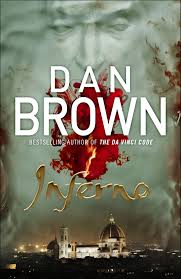Thoughts on books: Inferno – Dan Brown
 A few things come to mind with this novel. Firstly, I don’t see how critics attempting to detract from the work by criticising Dan Brown’s style is constructive or in fact warranted. Brown’s style isn’t particularly unique. He’s a genre writer and for that reason one doesn’t want to spend time considering word usage and phrasing while reading a page turner. Because that’s what Brown writes and his style, simple and accessible, plays into that.
A few things come to mind with this novel. Firstly, I don’t see how critics attempting to detract from the work by criticising Dan Brown’s style is constructive or in fact warranted. Brown’s style isn’t particularly unique. He’s a genre writer and for that reason one doesn’t want to spend time considering word usage and phrasing while reading a page turner. Because that’s what Brown writes and his style, simple and accessible, plays into that.
This leads me to my second thought; Dan Brown writes page turning novels, not heart breaking, soul crushing meandering literary fiction. There is enough excitement and intrigue to pull the reader from one page and onto the next, and anyone who’s read Brown knows that quickly becomes one chapter then the next.
Inferno also showed me something interesting about Dan Brown, he has a formula. Every one of the Robert Langdon books follows it. In each book Langdon must crack a code (solve a puzzle or mystery) only he can see or find (due to his symbology background). He meets a beautiful woman who becomes his companion and together they solve the riddle, save the world and, at the end they fall for each other.
As for the plot, the characterisation is always the same. Aside from small things, such as Langdon lamenting the loss of his Mickey Mouse watch in Inferno, we never learn anything about Langdon. He doesn’t grow and he doesn’t change, by now he should be a master code cracker and at least one Government secret service should have him on a watch list of some kind. With Langdon we’re given a clean slate, every time.
Brown is good at writing twists (this doesn’t mean I think the twists are good, quite the opposite) he knows how to lay them out, he can make you guess and they fit seamlessly into the novel. While the twists pack a reasonable amount of ‘I didn’t see that coming’ it feels as though there is too much riding on catching the reader by surprise. Twists can shock and enthrall but they are almost always at the end and this means they shape the final impression of the book. Brown’s end based twists feel as though they only serve the purpose of keeping the reader hooked, the closing pages work enough to get you to the back cover.
I’m not one that cares much for the technical side of writing but there is one thing I couldn’t miss. Brown, like many other authors since books were first written, uses the three act structure. There is the seen or unseen event that motivates the protagonist, then change/realisation/reaffirming event, and finally, the story draws to a close with the resolution. For me, this let Inferno down it was in another way frustratingly similar to the predecessors and with all of the above taken into account, there was a hit of deja vu.
Of course, there is a reason that Dan Brown is an International best seller and the author of one of the best selling books of all time (Da Vinci Code). His books are entertaining, they are high paced and interesting and Brown, despite my observations, kept the book in my hand start to finish. The novels are also informative, you can pick up any Dan Brown book and learn at least one knew thing.
Informative and information dump are two very different things and at some points, Brown slips into information dumps. I consider it all to be interesting, but the timing in places is particularly strange. Information dumped during a chase scene when Langdon and Sienna come across a new building. Not only the history of the building (or area as the case may be) but also the height of the building and the number of tiles on the roof. The information lead to be distracting at other points ( I would be interested in a Dan Brown non fiction) where it felt as though it were written to fill up space on the page.
